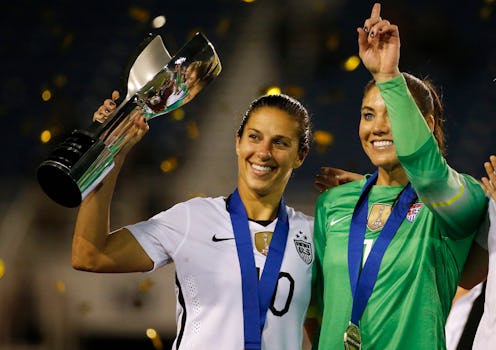On Thursday, The New York Times reported that five key players from the U.S. women's national soccer filed a lawsuit against the U.S. Soccer Federation (USSF) on the basis of wage discrimination. The move marks an historic effort to close the sports industry's notorious gender wage gap. Players Megan Rapinoe, Becky Sauerbrunn, Hope Solo, Carli Lloyd, and Alex Morgan will represent the team in the case, and each have released statements regarding their decision to confront U.S. Soccer.
Winston & Stawn, a law firm with a history of representing athletes, will be handling the case. According to its co-chairman Jeffrey Kessler, the women's team requested equal pay months ago. Still, the federation has failed to comply:
In early January, the Women's National Team Players Association submitted a reasonable proposal for a new CBA that had equal pay for equal work as its guiding principal. US Soccer responded by suing the players in an effort to keep in place the discriminatory and unfair treatment they have endured for years.
The USSF filed a lawsuit against the women soccer players' union a month after the team proposed the collective bargaining agreement for equal pay that Kessler cited. In February 2016, the federation claimed that it feared the team had intentions to go on strike before the Olympics began, since no agreement had been made. The USSF promptly responded to the team's retaliatory suit in a public statement on Thursday, claiming that the problem had never been brought to their attention until now:
We understand the Women's National Team Players Association is filing a charge with the Equal Employment Opportunity Commission against U.S. Soccer. While we have not seen this complaint and can't comment on the specifics of it, we are disappointed about this action. We have been a world leader in women's soccer and are proud of the commitment we have made to building the women's game in the United States over the past 30 years.
On Wednesday evening, the women's soccer team brought their complaint to the Equal Employment Opportunity Commission, the federal agency responsible for ensuring the implementation of the equal pay law. According to numbers crunched by the EEOC, female soccer players are paid anywhere between 28 and 60 percent less than their male counterparts.
The U.S. women's soccer team has built up the USSF's reputation since it won the first-ever FIFA Women's World Cup in 1991. From March 2008 until the end of 2014, the team maintained a number-one spot in the FIFA women's world rankings. After losing the title to Germany, the current women's team reclaimed it, winning the 2015 World Cup. According to the USSF's 2015 financial report, which is cited in the lawsuit, the women's soccer team's success generated a major profit for the organization. In fact, the figures show that the women's team produced $20 million more in revenue for the federation than the men's team. Yet the men are paid more.
If the USSF cannot come to an agreement with the EEOC, the federal agency has the authority to file an enforcement action on the basis of Title VII's prohibition of employment discrimination based on sex.
